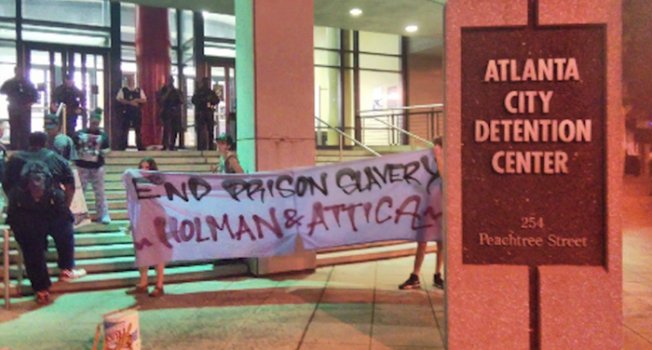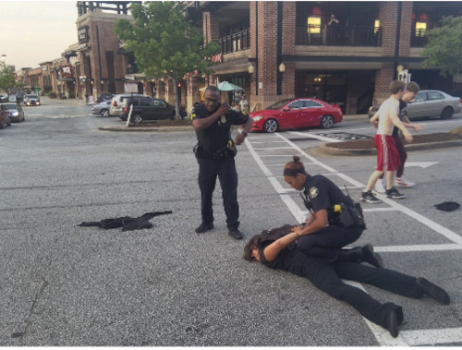Filed under: Action, Incarceration, Political Prisoners, Southeast, White Supremacy

Submitted to It’s Going Down
There are those who wish to ignore, to defend, or to hide away the torture, slavery, and isolation that occurs in this country under the comforting banner of Justice.
We do not understand them, and they do not understand us.
The practical destruction of capitalism requires that we continue threading together practices of revolt and autonomy, that we continue to sense out the new realities emerging from our movements. It is absolutely clear to us that as we continue to get organized, that is, to give greater substance to our situation, to make it seem and feel more and more real, that we will encounter other forces which are either doing the same, or which are organizing to preserve the current stupidity.
This deep ethical polarization, this struggle between competing ideas of life and happiness, signals the end of the democratic fiction, the end of “society.” Even the rich agree: there is no one world and there never has been. For at least forty years – since the last great assault on capital was defeated – crisis management has been the preferred technique of governmental control. Islamic terrorism, spree shootings, illegal immigration, and black revolt have all been used to justify a regime of increasing police militarization, preemptive containment in ghettos and jail cells, and the redevelopment of city space in the name of safety, resilience, and economic hyper productivity. Retired drones from the war in Iraq hover over Baltimore while Terra Bella – one of Google’s latest fancy purchases – plans to deploy satellite cameras across the entire planet. The existential ruin necessary to organize this much suffering has left no one unscathed. In all of this, prisons function not only as the camps which contain and repress surplus proletarians unable or unwilling to be integrated into the dominant form of life, but also as productive centers constantly churning out passive tolerance and spiritual destitution amidst a civilization in decay.
CARCERAL UNIONISM AND COMBATIVE PICKETS
On September 9, 2016, inmates across the United States began the largest prison strike in American history. In South Carolina, in Michigan, in Florida, and around the country, prisoners have formed organizing groups and launched offensive campaigns against racist guards, snitches, and administrative personnel. Overcoming boundaries of race and confinement, they have collectively refused to work – not to reform the prison system, but to directly abolish their status as slaves. In solidarity with prisoners risking their lives for their dignity, a roving picket mobilized in Atlanta to bring the strike directly to those who benefit the most from their free labor.
Marching behind banners and a sound system, picketers stopped at the locations of multiple prison-profiteering corporations including Wendy’s, McDonald’s, Starbucks, and major prison contractor Aramark. After disrupting business-as-usual at the Wendy’s, a renegade police officer attempted to use his cruiser to run over demonstrators who refused to get out of the street. In the McDonald’s, staff and patrons erupted into applause, shouting “black lives matter,” dancing in the lobby, and demanding $15 an hour from their bosses. None were scandalized when demonstrators helped themselves to free drinks and fries, slashed cushioned seating, and covered restaurant equipment with stickers decrying prison slavery.
As the march approached Starbucks, two hecklers shouted at the crowd, attempting to antagonize picketers with reactionary comments. The crowd moved past them into the store, but the two followed, and escalated the situation by dumping hot coffee down the neck of a protester. While they repeatedly attempted to instigate a fistfight, picketers continuously refused to engage them. For reasons we still cannot piece together, the hecklers – in some bizarre performance only a professional soccer player could pull off – began running up to demonstrators and throwing themselves onto the floor, flailing melodramatically as though they had been shoved.
The crowd flooded out of the Starbucks with the two customers in tow, now crying and screaming for the police. Unsatisfied with the efforts of the cops, the pair attempted to punch and subdue several picketers. In the escalating chaos, the Starbucks was ransacked: displays of merchandise were smashed, thrown, and knocked to the ground. Police rushed to intervene, deploying pepper spray everywhere – including against themselves – and began scrambling to grab any protester they could, eventually slamming multiple people to the ground amdist a cloud of mace. Three picketers were arrested and now face sets of trumped-up charges which falsely hold them responsible for the entirety of the melee. The two citizens were taken away in an ambulance. We do not know yet if these fools were police, right wing fanatics, insurance scammers, or just deluded millennials of weak constitution who could not bear to face the horror of reality for even a moment.
When the march was at McDonald’s, workers and patrons joined the chants at the first opportunity. At Starbucks, the absolute asymmetry of values, language, and even perception rendered simple communication impossible. When the police respond to disorder, they are not responding to the same event we are constituting. Likewise, when leftists, vigilantes, and non-profit professionals inject themselves into proletarian struggles, they are not responding to the same sensations, drives, passions, or desires as we are. Where they see threats, we see opportunities. Where they sense danger, we sense life. Their demand for justice will never satisfy our need for collective power. We are not here to justify our lives: we are here to live them.
We are distressed by the arrests at the picket, but we are not demoralized by them. Demonstrations of complicity and support for the strike have echoed across the continent and even the world. We hope to see these groups continue to amplify the struggle against prisons. We anticipate that the striking prisoners will feel more confident in their actions knowing the solidarity that exists on the outside, and that some who did not fight this weekend will consider fighting in the future because of this.
We recognize that the free sharing of potential – the liberation of life – is bound up and directly implicated in the ability of prisoners to catalyze crises inside the prison system. Their success is tied to our ability on the outside to initiate mass confrontations with carceral infrastructures and their proxy operations in retail and industry.
In these moments of struggle, positions have been taken which have begun to constitute parties grasping for new ideas, tools, and strategies for organizing inside of and against the present apocalypse.
Listen for their echoes.
Freedom is the crime which contains all crimes,
Let the crops rot in the fields,
Burn the American plantation.
-Some participants in the demonstration. We speak only for ourselves.







